 First edition | |
| Author | Nancy Mitford |
|---|---|
| Country | United Kingdom |
| Language | English |
| Publisher | Random House |
Publication date | 1951 |
| Media type | Print (hardcover) |
| Pages | 305 |
The Blessing is a comic satirical novel by Nancy Mitford, first published in 1951.
 First edition | |
| Author | Nancy Mitford |
|---|---|
| Country | United Kingdom |
| Language | English |
| Publisher | Random House |
Publication date | 1951 |
| Media type | Print (hardcover) |
| Pages | 305 |
The Blessing is a comic satirical novel by Nancy Mitford, first published in 1951.
It is set in the post-World War II period and concerns Grace, an English country girl who moves to France after falling for a dashing aristocratic Frenchman named Charles-Edouard who lusts after other women. Their son Sigi aims to keep his parents apart by engineering misunderstandings.
A 1959 film called Count Your Blessings was based in the novel. It starred Deborah Kerr, Rossano Brazzi, and Maurice Chevalier.
Jan Karon is an American novelist who writes for both adults and young readers. She is the author of the New York Times-bestselling Mitford novels, featuring Father Timothy Kavanagh, an Episcopal priest, and the fictional village of Mitford. Her most recent Mitford novel, To Be Where You Are, was released in September 2017. She has been designated a lay Canon for the Arts in the Episcopal Diocese of Quincy (Illinois) by Keith Ackerman, Episcopal Bishop of Quincy, and in May 2000 she was awarded the Degree, Doctor of Humane Letters honoris causa by Nashotah House, a theological seminary in Nashotah Wisconsin. {“More from Mitford” Volume 4, Number 10, Fall 2000.} In 2015, she was awarded the Library of Virginia's Literary Lifetime Achievement Award.
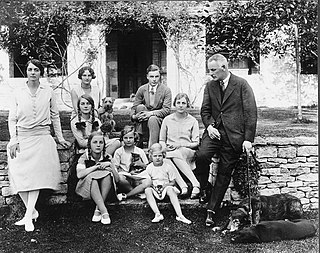
The Mitford family is an aristocratic English family whose principal line had its seats at Mitford, Northumberland. Several heads of the family served as High Sheriff of Northumberland. A junior line, with seats at Newton Park, Northumberland, and Exbury House, Hampshire, descends via the historian William Mitford (1744–1827) and were twice elevated to the British peerage, in 1802 and 1902, under the title Baron Redesdale.
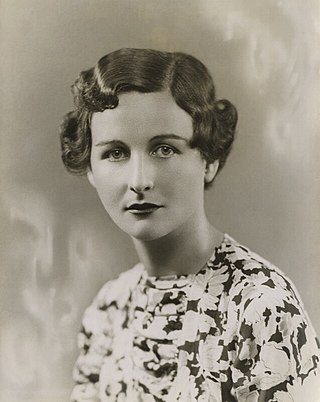
Nancy Freeman-Mitford was an English novelist, biographer, and journalist. The eldest of the Mitford sisters, she was regarded as one of the "bright young things" on the London social scene in the inter-war period. She wrote several novels about upper-class life in England and France, and is considered a sharp and often provocative wit. She also has a reputation as a writer of popular historical biographies.

Jessica Lucy "Decca" Treuhaft was an English author, one of the six aristocratic Mitford sisters noted for their sharply conflicting politics.
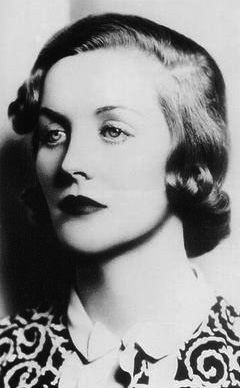
Diana, Lady Mosley, known as Diana Guinness between 1929 and 1936, was a British aristocrat, fascist, writer and editor. She was one of the Mitford sisters and the wife of Oswald Mosley, leader of the British Union of Fascists.

The Pursuit of Love is a novel by Nancy Mitford, first published in 1945. It is the first in a trilogy about an upper-class English family in the interwar period focusing on the romantic life of Linda Radlett, as narrated by her cousin, Fanny Logan. Although a comedy, the story has tragic overtones.

Brian Christian de Claiborne Howard was an English poet and later a writer for the New Statesman.
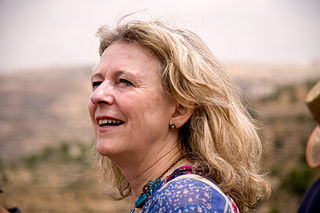
Deborah Moggach is an English novelist and screenwriter. She has written nineteen novels, including The Ex-Wives, Tulip Fever, These Foolish Things and Heartbreak Hotel.

Gaston Palewski, a French politician, was a close associate of Charles de Gaulle during and after World War II. He is also remembered as the lover of the English novelist Nancy Mitford, and appears in a fictionalised form in two of her novels.
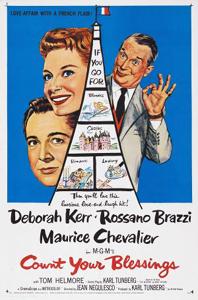
Count Your Blessings is a 1959 American romantic comedy drama film released by Metro-Goldwyn-Mayer. It was directed by Jean Negulesco, written and produced by Karl Tunberg, based on the 1951 novel The Blessing by Nancy Mitford. The music score was by Franz Waxman and the cinematography by George J. Folsey and Milton R. Krasner. The costume design was by Helen Rose.
A blessing is a type of religious pronouncement.
Combe Florey House in Combe Florey, Somerset, England is a country house dating from the early 18th century. It replaced an Elizabethan manor house which was pulled down after the English Civil War. The gatehouse to the original manor survives. In the mid-20th century, the house was home to the writer Evelyn Waugh who died there in 1966 and is buried next to the churchyard of the adjacent Church of St Peter & St Paul. Combe Florey House is a Grade II listed building.

David Bertram Ogilvy Freeman-Mitford, 2nd Baron Redesdale, was a British peer, soldier, and landowner. He was the father of the Mitford sisters, in whose various novels and memoirs he is depicted.

Don't Tell Alfred is a novel by Nancy Mitford, first published in 1960 by Hamish Hamilton. It is the third in a trilogy centred on an upper-class English family and takes place twenty years after the events of The Pursuit of Love and Love in a Cold Climate. It was Mitford's final novel, though she continued to produce works of biography for a number of years before her death in 1973.

Batsford Arboretum is a 55-acre (220,000 m2) arboretum and botanical garden near Batsford in Gloucestershire, England, about 1½ miles north-west of Moreton-in-Marsh, at grid reference SP187339. It is owned and run by the Batsford Foundation, a registered charity, and is open to the public daily throughout most of the year.

The Bright Young Things, or Bright Young People, was a term given by the tabloid press to a group of Bohemian young aristocrats and socialites in 1920s London. They threw flamboyant fancy dress parties, went on elaborate treasure hunts through nighttime London, and some drank heavily or used illicit drugs — all of which was enthusiastically covered by journalists such as Charles Graves and Tom Driberg.
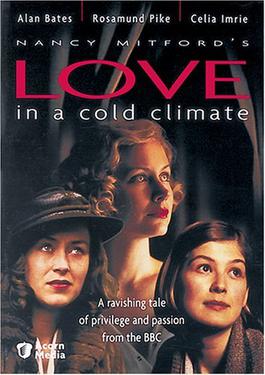
Love in a Cold Climate is a British serial drama miniseries produced by the BBC in association with WGBH Boston, and first broadcast in two parts on BBC One on 4 and 11 February 2001. The series was adapted by Deborah Moggach from Nancy Mitford's novels The Pursuit of Love (1945) and Love in a Cold Climate (1949), and was directed by Tom Hooper.

Wigs on the Green is a 1935 satirical novel by Nancy Mitford. A roman à clef, it is notable for lampooning British fascism, specifically political enthusiasms of Mitford's sisters Unity Mitford and Diana Mosley.
The Blessing may refer to:
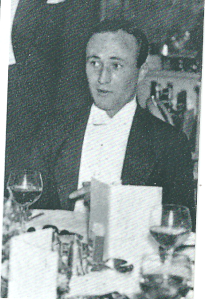
Charles Randolph Mark Ogilvie-Grant was a British diplomat and a botanist and one of the earliest members of the Bright Young Things. Despite his earliest frivolous past, he became a hero during the 1940–1941 Greek campaign.